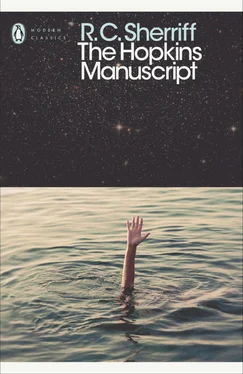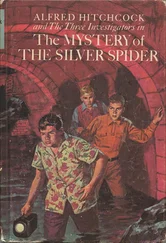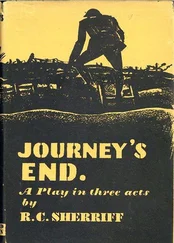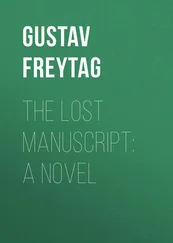Роберт Шеррифф - The Hopkins Manuscript
Здесь есть возможность читать онлайн «Роберт Шеррифф - The Hopkins Manuscript» весь текст электронной книги совершенно бесплатно (целиком полную версию без сокращений). В некоторых случаях можно слушать аудио, скачать через торрент в формате fb2 и присутствует краткое содержание. Год выпуска: 2018, ISBN: 2018, Издательство: Penguin Books, Жанр: sf_postapocalyptic, humor_satire, на английском языке. Описание произведения, (предисловие) а так же отзывы посетителей доступны на портале библиотеки ЛибКат.
- Название:The Hopkins Manuscript
- Автор:
- Издательство:Penguin Books
- Жанр:
- Год:2018
- ISBN:978-0-241-34908-3
- Рейтинг книги:4 / 5. Голосов: 1
-
Избранное:Добавить в избранное
- Отзывы:
-
Ваша оценка:
- 80
- 1
- 2
- 3
- 4
- 5
The Hopkins Manuscript: краткое содержание, описание и аннотация
Предлагаем к чтению аннотацию, описание, краткое содержание или предисловие (зависит от того, что написал сам автор книги «The Hopkins Manuscript»). Если вы не нашли необходимую информацию о книге — напишите в комментариях, мы постараемся отыскать её.
The Hopkins Manuscript — читать онлайн бесплатно полную книгу (весь текст) целиком
Ниже представлен текст книги, разбитый по страницам. Система сохранения места последней прочитанной страницы, позволяет с удобством читать онлайн бесплатно книгу «The Hopkins Manuscript», без необходимости каждый раз заново искать на чём Вы остановились. Поставьте закладку, и сможете в любой момент перейти на страницу, на которой закончили чтение.
Интервал:
Закладка:
‘It’s terribly smashed up,’ put in an old lady.
‘Lucky for us it is,’ replied the guide. ‘If the moon hadn’t broken up when it hit us, we might have been broken up instead.’
Some of the members of the party expressed approval at this reasoning, and we followed the guide up a twisting, broken path until we came to a small tea shop labelled in large letters: ‘First House on the Moon’.
We bought some picture postcards and a small fragment of the moon upon which was painted a little effigy of the moon’s face as we had once known it. Around this effigy was written ‘What I was’ and upon the slaty substance was painted ‘What I am’. It was an interesting novelty which I determined to keep for Aunt Rose if ever I should see her again.
‘How horribly dreary,’ whispered Pat as we walked back to the charabanc.
I nodded in silent agreement, but to me there was far more than dreariness in that ominous expanse of grassless, treeless waste. There was something menacing and sinister in it that made me shudder. I wished that I had never seen it. I had led myself to believe that the moon was done with and harmless now that it had arrived and hit us, collapsed and settled down. I had grown to regard it as another Sahara, another Siberia that might in time become the haunt of animals, even, perhaps, of a few lonely human beings. But I went away from it with a strange, indefinable dread: a haunting conviction that the terrors of its arrival were trivial beside the horrors that it held in store for us.
CHAPTER TWENTY-FIVE
The first hint of impending trouble came to us one autumn night.
During the summer Pat had been laid up with an injured knee, and I had called in a doctor from Mulcaster – a Dr Cranley. Having assured himself that the injury was in no way serious, Dr Cranley handed over the case to his son Peter, with happy if somewhat unconventional results.
Peter was a pleasant, cheerful boy. A medical student at the time of the cataclysm, he was now completing his training as best he could as partner to his father. Directly Pat was able to get up, Peter made a point of assisting her every morning upon a short walk across the downs, explaining that exercise to the injured muscle was essential. I observed that these ‘curative walks’ became longer every day, and when, one morning, Pat announced her knee to be so far recovered that the doctor had suggested they took a picnic lunch with them I naturally realised that something was in the wind.
One Sunday Peter came to tea, bringing with him a charming sister named Joan. Robin had affected to scorn Pat’s behaviour with the young doctor, but upon Joan’s arrival he suddenly woke up himself. He took her down to see his rabbit farm and presented her with three of his best fish to take home for supper.
Within a short time the four of them were firm friends and constant companions. They repaired the tennis court upon the lawn of the ruined Manor House: they danced together at Mulcaster and went upon long walks across the downs.
Although naturally this led to some lonely evenings for me, I was delighted that Pat and Robin had found such cheerful companions of their own age. Despite their staunch devotion to their work and home, I had long been worried by the monotony of their evenings, and the occasional loneliness that I now experienced was well repaid by the wider interests and greater happiness of my young companions. They even began planning an Amateur Theatrical Club in Mulcaster – and promised me a part!
But it is a sad irony that this new and happy companionship should have led to the ominous, disturbing night that I have already referred to.
One evening in late September, Dr Cranley invited the three of us to dine at his home in Mulcaster, adding that Major Jagger, Parliamentary Representative for Hampshire, would also be his guest.
I shall never forget our journey to Mulcaster through the dusk of that lovely autumn evening. Perhaps, in reality, it was just an ordinary journey like many others: perhaps my memory had idealised it because it was the last evening of a precious span of happiness that nestled between cataclysm and final disaster, for never again did I feel the peace and tranquillity of that happy, twilit journey.
I remember how the sunset lingered upon the tarnished old windscreen of our car, how suddenly, as we dropped into the valley, the stars were glimmering in the pale, evening sky: how for a while we shouted jokes at one another above the rattle of the car, and how, as the moonless night enwrapped us, Robin’s eyes became intent upon the rough, precarious road, and Pat and I lay back in silence with our thoughts.
I thought of this wonderful year that was drawing to its close: this year of striding progress – the peace and gathering prosperity of Europe. All the bitterness and hostility, all the suspicions and racial hatreds that had threatened and darkened the closing years of the old world had gone for ever. The nations of Europe had arisen from the ruins of the cataclysm, cleansed of greed, drawn into harmony by a common disaster; determined to build a new world in friendship and mutual respect. The cataclysm had almost destroyed us, but from the ashes had arisen the United States of Europe.
But nothing gave greater cause for satisfaction than the progress and growing renown of my poultry farm. In the old days it was my hobby: today it was my profession. I had purchased two new cockerels of sturdier type and better blood than my first one. My long experience, and, I might say, genius in poultry breeding had enabled me to produce a fine, distinctive strain that was already known throughout all Hampshire as the ‘Beadle-Hopkins’. The ‘Beadle-Hopkins’ hens were fine layers, and with few exceptions careful and successful mothers, while the ‘Beadle-Hopkins’ cockerels were eagerly sought after in Mulcaster Market for breeding purposes and fetched high prices.
People came in from miles around to secure a ‘Beadle-Hopkins’ cockerel and I gained a great deal of amusement by sauntering about the market upon the days when my birds were on sale. If I heard anybody mention the name ‘Beadle-Hopkins’ I would sometimes saunter up to them and casually introduce myself. It was a treat to see the expression on their faces: to hear them say ‘Hopkins? – not the Hopkins!’ It was a simple, inexpensive way of giving people pleasure, and I never failed to secure a thrill at the thought of having given my name to a breed of domestic fowl that would endure long after I was dead.
It is easy to understand how happy and contented I felt that night. I was excited, too, at the prospect of meeting Major Jagger, a member of our new and energetic Parliament, for although I had met, at different times, almost every famous personality in the Poultry Times, my quiet career had not brought me into touch with eminent persons in other walks of life.
Dr Cranley’s house lay upon the outskirts of the town, in a broad, old-world avenue that seemed to have escaped the worst ravages of the hurricane. We were very impressed, as we drove up the drive, to see Major Jagger’s car standing by the door, with its big yellow badge denoting its use by a high official of our new National life.
Robin parked our old Ford as far from the magnificent limousine as he could, to avoid odious comparison, but he could not tear himself away from the big new car.
‘What a beauty!’ he whispered. ‘One of the new ones from the Government Factory near Oxford. Just look at that glorious instrument board!’
‘We’ve come to dine with Dr Cranley,’ I gently reminded him, ‘not to stand gaping at his guest’s car!’
‘Wonder what the politician will be like?’ said Robin, as we walked to the front door.
Читать дальшеИнтервал:
Закладка:
Похожие книги на «The Hopkins Manuscript»
Представляем Вашему вниманию похожие книги на «The Hopkins Manuscript» списком для выбора. Мы отобрали схожую по названию и смыслу литературу в надежде предоставить читателям больше вариантов отыскать новые, интересные, ещё непрочитанные произведения.
Обсуждение, отзывы о книге «The Hopkins Manuscript» и просто собственные мнения читателей. Оставьте ваши комментарии, напишите, что Вы думаете о произведении, его смысле или главных героях. Укажите что конкретно понравилось, а что нет, и почему Вы так считаете.












